Tuesday Feb 24, 2026
Tuesday Feb 24, 2026
Thursday, 5 December 2019 00:00 - - {{hitsCtrl.values.hits}}
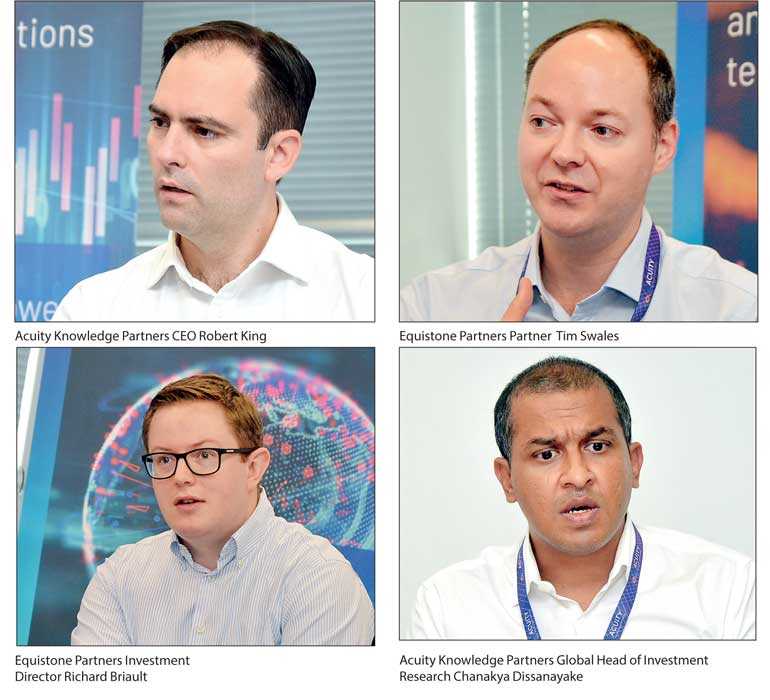
By Nisthar Cassim
The new owners of research and analytics firm Acuity Knowledge Partners (formerly a Moody›s Corporation subsidiary) are committed to expanding their operations in Sri Lanka, as they believe it is the fastest-growing location among their global delivery centres.
Last month, Moody’s Analytics Knowledge Services (formerly Amba Research) announced its rebranding as Acuity Knowledge Partners. This followed a management buyout from Moody’s Corporation, supported by European mid-market private equity investor Equistone Partners Europe Ltd. (Equistone).
Founded in Sri Lanka in 2003 and with offices in the UK, the US, India, Costa Rica, and China, Acuity is a leading provider of bespoke research, analytics and automation technology to the financial services sector. With 270 analysts at present, its Sri Lanka operations are the most profitable and the fastest growing. 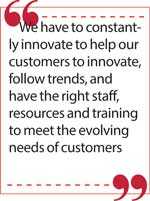
To announce the new ownership and branding, Equistone Investment Director Richard Briault and Partner Tim Swales were in Sri Lanka, along with Acuity CEO and Director Robert King.
The Daily FT met with the trio and Acuity Senior Director, Country Head – Sri Lanka and Global Head of Investment Research Chanakya Dissanayake to get more insight on investment, Acuity’s local and global operations and new developments in the offshoring of research and analytics support in the global financial services industry.
Robert stressed that Acuity’s EBITDA has grown over 20% overall and that “Sri Lanka is the most profitable delivery centre globally”.
Acuity has a client base of over 300 financial services firms globally in domains such as investment banking, investment research, private equity and consulting and commercial lending. It employs over 2,500 qualified analysts globally, with Sri Lanka accounting for about 10% of them.
While the change in ownership was announced in July this year, Acuity reported a record third quarter. “We were very pleased that the market reacted positively to the announcement. Customers value our service and expertise,” said Robert.
“Our staff know that we have a strong backer in Equistone and that the business is performing well and we are investing in Sri Lanka. We opened new delivery facilities that will result in 20% growth in numbers this year. We expect similar growth next year. Sri Lanka will be our fastest-growing location,” revealed Robert.
“A growth backer like Equistone can aid us when we look at growth opportunities for the business. We plan to look at new business lines in the broader financial services industry. We intend to look at inorganic growth opportunities and accelerate investment in automation technology. With Equistone’s backing, we are now well positioned to pursue these growth opportunities,” he emphasised.
Equistone’s Tim and Richard said they invest only in successful, well-established and growing businesses. “We don’t look for difficult, turnaround or distressed situations. This business (Acuity) has been growing at a 10% CAGR for a very long period, and that’s very positive.”
Equistone considered Acuity’s diversity, stability and longevity before investing.
“We can bring a lot of capital and support to the business, as Acuity is a priority investment for us. We did a great deal of diligence prior to investing, and some of the key takes were high ratings for the work done by Acuity and the diversity of the business operations,” they said.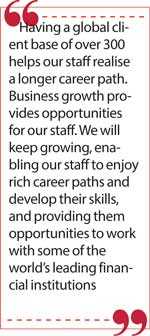
“We can also bring some strategic focus for the business, although the management team has done a fantastic job so far in growing the business,” they added.
Following the acquisition, Equistone brought in global financial services specialist Philip Gore-Randall as Non-Executive Chairman.
Robert revealed that Acuity will add 400 more analysts globally next year. “Sales efforts to accommodate growth are ongoing. We are very confident that our revenue will grow by double digits next year, and we are assured of a strong 2020,” he added.
Chanakya stated that 2019 has been a special year of growth for all of Acuity’s business operations. After the temporary blip in demand in 2018 because of the introduction of the EU’s Markets in Financial Instruments Directive ll (MiFID ll) framework and other regulations, business from asset management clients in both the US and Europe has seen a very sharp recovery this year. Some of the new services such as environmental, social and governance (ESG) research offered to buy-side asset managers, have gained substantial traction as well.
Chanakya also said that the industry has responded positively to the entry and support of Equistone. “Immediately after Equistone invested in the company, a host of new clients signed up. Among them were four major-league investment banks and asset managers. This is because the industry knows Equistone’s credentials – its 40-year track record as a credible and successful private equity firm. If Equistone saw value in the company and the business, it is a further validation of our business model,” he explained.
Robert, as CEO and co-investor, together with Equistone, has recognised and included Acuity’s tenured analyst pool in the ownership structure. Its analysts are its biggest asset, serving over 300 of the world’s top financial corporations. “As an employee from day one, I can say that this move has had a tremendous motivational impact,” Chanakya added.
Way forward and outlook
Robert was emphatic that Acuity wants to be the #1 offshore research and analytics partner for the global financial services sector. “We believe we are the largest and leading player, and we wish to grow from strength to strength.” 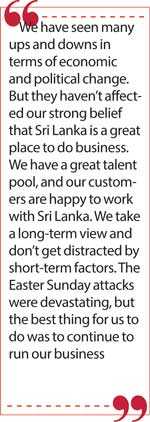
He said it was equally important to continue to build a great company for clients and a great place to work for staff, where they have career opportunities and a dedicated and caring management team who will invest further in training and educating them. “We also want to invest in the communities we work in. It is important that we are a company to be proud of and our employees are proud to work for,” he added.
Acuity’s core business is investment research; according to Robert, this continues to see phenomenal growth both from the buy and sell sides. “We also see growth in smaller and newer areas in ESG research and technology-related initiatives such as data analytics and data science. We have to constantly innovate to help our customers to innovate, follow trends, and have the right staff, resources and training to meet the evolving needs of customers,” he pointed out.
Chanakya said that during the past three years, priority was given to increasing the tenure of career analysts by providing technical and management training.
“Our push towards ESG research was made possible with our investment to get the best training from institutions for our analysts, such as the PRI Certification Program. We have had many ESG research wins, and it is one of our fastest-growing business verticals.”
Acuity has also seen the emergence of an entirely new segment – private wealth management, which has become a significant part of the global capital markets space. “These firms used to satisfy internal research needs by partnering with the investment banks that owned them. But now, due to regulations and other reasons, they are required to have their own research products, and Acuity has been one of the biggest partners for this segment that now relies on offshore solutions,” revealed Chanakya.
A talent hub nurturing future talent
Acuity is one of the largest recruiters of the highest-ranking graduates of the country’s leading universities and educational institutions. Of Acuity’s 270 employees, 15% are postgraduates/hold MBAs, and 50% are CIMA-/ACCA-qualified. Over 45% of the CFA Charterholders in Sri Lanka have been trained at Acuity. Some of its ex-employees hold senior positions in financial markets globally and locally, and almost 80% of the heads of research in Sri Lanka’s capital market have built their careers with Acuity. Both Robert and Chanakya mentioned that staff retention has improved consistently due to the company investing in them and enhancing their career paths and skill sets, and by creating a company they can be proud of in terms of the culture it fosters. Acuity also rotates staff from equity research to fixed income and vice versa, and from supporting investment banks to buy-side asset managers. “Having a global client base of over 300 helps our staff realise a longer career path,” they added.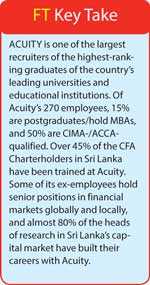
“Business growth provides opportunities for our staff. We will keep growing, enabling our staff to enjoy rich career paths and develop their skills, and providing them opportunities to work with some of the world’s leading financial institutions,” added Robert.
He said Acuity will also continue to enhance its engagement with the local universities that it has worked with over the past 15 years, continuing to tap the country’s talent. “We are proud and privileged to have this strong relationship with the universities. Sri Lanka’s talent pool can easily support 50-60 new recruitments annually,” he said.
Chanakya also said that Acuity is very appreciative of the level of proactive engagement with the different faculties of the universities. For example, the Colombo, Moratuwa, Jayewardenepura and Kelaniya universities have weekly knowledge-sharing sessions with the company. Acuity’s senior analysts also conduct training sessions for junior faculty members on subjects such as equity valuation.
More recently, with Acuity making a major push towards data science, some of its seniors leading the data analytics and data science functions have conducted training sessions on Python programming and new areas of finance and data analytics.
“Some of the skills that we used to think were separate are now converging. Our clients want converged capabilities,” said Chanakya. For example, one client – a European investment bank’s research team – followed Python training to enhance their typical financial analysis with automated web scraping to get additional insight.
“We were able to get our Quantitative Services team to conduct internal Python training for investment research analysts; we have received good feedback in terms of client satisfaction,” he added.
The profile of Acuity’s hires is also changing. Previously, they had engineering or finance and accounting qualifications.
“We now have analysts doing pure-play ESG work. We have hired analysts who were ESG consultants for multinationals in Sri Lanka. Globally, a lot of ESG content is required in research, as ESG is not a standalone area, but all fund managers, as part of their ongoing investment, are required to have basic ESG screening. This is a huge opportunity for us,” Chanakya pointed out.
Clients need analyst bandwidth to deep dive so they can know whether they are investing in a company that meets local or regional ESG regulations and adopts global best practices.
Robert pointed out that Acuity’s data science practice has grown threefold and that the foundation for that is in Colombo. “It is one of the fastest-growing verticals of our business. The data science practice will continue to complement equity and credit analysis. It will grow from a niche activity to a day-to-day requirement in core analytics,” he added.
Chanakya added: “Most of the investment banks we serve have built data science teams that support their multiple-sector research teams. The challenge is to come up with publishable content interesting enough for their asset managers to read, especially in the retail and consumer sectors. Clients benefit via a search for unique insights, and Acuity is a good partner for that journey.”
The Equistone representatives said that as a private equity investor, Equistone looked at the level of sophistication in Acuity’s research. “The new capabilities are becoming more important, but it doesn’t change the fundamental approach to investing,” Chanakya added.
He also said that Acuity does not see Sri Lanka in isolation. “One of Colombo’s strengths is that we can have senior analysts from offices in India working for initial ramp-up and training. Its strategic location enables Colombo to benefit from a larger pool of expertise within the region,” he added.
Sri Lanka’s attractiveness and outlook
Robert recalled that as Acuity has been operating in Sri Lanka for over 15 years, it has seen many ups and downs in terms of economic and political change. “But they haven’t affected our strong belief that Sri Lanka is a great place to do business. We have a great talent pool, and our customers are happy to work with Sri Lanka. We take a long-term view and don’t get distracted by short-term factors. The Easter Sunday attacks were devastating, but the best thing for us to do was to continue to run our business.”
Chanakya recalled that a long-term anchor client who signed up with Acuity and made the new facilities a reality did so three days after the Easter Sunday attacks.
Robert also stressed that for prospective foreign companies keen on establishing operations in Sri Lanka or doing business with Sri Lanka, the best reference is Acuity’s experience and success.
“Sri Lanka is a great source of analytical talent. Some of our global leadership talent started from Sri Lanka, and three of our seven business lines are headed by staff resident in Sri Lanka. This is a great place to do business and source talent, and we found that our customers have really valued Sri Lanka’s input. We are confident of achieving significant growth,” emphasised Robert.
Chanakya pointed out that Acuity plans to continue to contribute to improving the quality of university education and to hire more technology and finance graduates. He also said that Public-Private Partnership models adopted by the Sri Lanka Institute of Nanotechnology (SLINTECH) and the National Institute of Business Management (NIBM) are good initiatives that Acuity finds very encouraging.
Acuity Knowledge Partners occupies Levels 15, 32 and 36 of the West Tower of the World Trade Center. The office space on Level 15 was added in May 2019 to meet increased demand for the provision of credit research services to leading global banks.
Pix by Upul Abayasekara